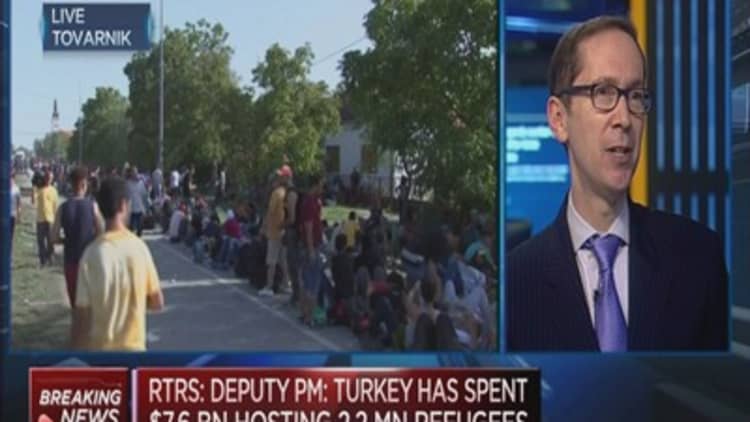European authorities have relocated their first group of migrants as part of a bloc-wide plan to share the weight of the growing refugee crisis. However, those who fail to gain asylum may not be so lucky.
Italy Friday sent 19 Eritrean men and women to Sweden as part of the first batch of migrants taking part in the relocation program. This, albeit small, start is part of the commitment made by European Union (EU) member countries last month to relocate 160,000 asylum seekers throughout Europe over the next two years. The agreement was reached in order to help alleviate pressure on countries like Italy and Greece, where over 470,000 migrants have landed since January alone, according to EU border agency Frontex.
At the same time, however, Italy was deporting 28 Tunisians and 35 Egyptians back home.
A press release by justice and interior ministers from across the European Union (EU) Thursday revealed plans to ramp up deportations and prepare dedicated detention centers that would lock up migrants as a "last resort."
"When we talk about refugees, we need to also talk of those who are not refugees," Dimitris Avramopoulos, European Commissioner for Migration, Home Affairs and Citizenship, said in a statement Friday. "We need to be better and more effective, not just at helping people and offering refuge, but also at returning those who have no right to stay."
"All of these actions have to go together," he said.
An expanded return program would see more migrants who fail to gain asylum status deported to their home countries. Ministers believe the move will deter migrants who lack legitimate asylum claims from making the journey to Europe, the statement explains.
The 3.1 billion euro ($3.5 billion) Asylum, Migration and Integration Fund will help finance the return program, along with the 800 million euros ($908 million) set aside for deportations by member states for the six years between 2014 and 2020.

But EU countries should also be prepared to lock up migrants temporarily until they can safely return home , the statement adds..
"All measures must be taken to ensure irregular migrants' effective return, including use of detention as a legitimate measure of last resort," the press release stated.
States should "reinforce" detention centers for migrants who are at risk of disappearing before they can be removed. However, the document also stresses that adequate steps should be taken to protect migrants' rights and prevent abuse.
Ministers also outlined expansion plans for EU border agency Frontex, which is already in the midst of recruiting 775 extra border guards to be deployed across Italy and Greece.
The council says a new Return Office will be set up immediately to help Frontex organize and fund migrant deportations more quickly. Ministers also called for a new 'Rapid Return Intervention Team' to help identify migrants and liaise with the consulates of migrant's respective states.
While countries are legally bound to readmit citizens, the EU will explore to how to best integrate migrants into neighbouring states, until they can be returned to their home countries.


